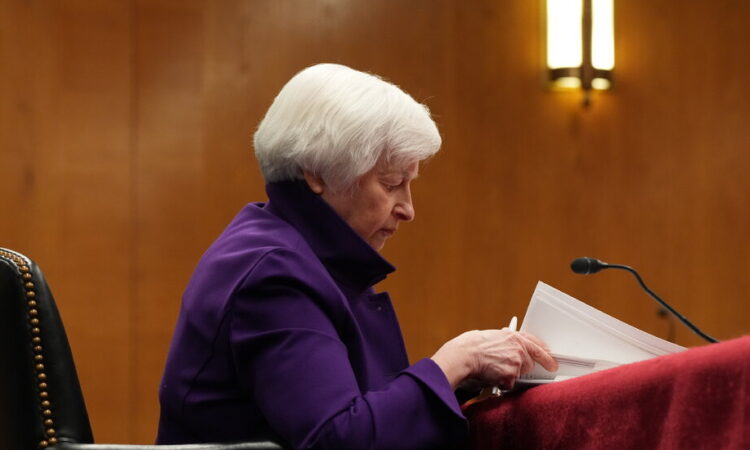
Treasury Secretary Janet L. Yellen will tell lawmakers on Tuesday that the United States has had a “historic” economic recovery from the pandemic but that regulators must vigilantly safeguard the financial system from an array of looming risks to preserve the gains of the last three years.
Ms. Yellen will deliver the comments in testimony to the House Financial Services Committee nearly a year after the Biden administration and federal regulators took aggressive steps to stabilize the nation’s banking system following the abrupt failures of Silicon Valley Bank and Signature Bank.
While turmoil in the banking system has largely subsided, the Financial Stability Oversight Council, which is headed by Ms. Yellen, has been reviewing how it tracks and responds to risks to financial stability. Like other government bodies, the council did not anticipate or warn regulators about the problems that felled several regional banks.
“Our continued economic strength depends on a solid and resilient U.S. financial system,” Ms. Yellen said in her prepared remarks.
Last year’s bank collapses stemmed from a confluence of events, including a failure by banks to properly prepare for the rapid rise in interest rates. As interest rates rose, Silicon Valley Bank and others absorbed huge losses, creating a panic among depositors who scrambled to pull out their money. To prevent a more widespread run on the banking system, regulators took control of Silicon Valley Bank and Signature Bank and invoked emergency measures to assure depositors that they would not lose their funds.
The bank failures — and the government’s rescue — prompted debate over whether more needed to be done to ensure that customer deposits were protected and whether bank regulators were able to properly police risk.
Ms. Yellen is expected to face questions about what has been done in the last year to safeguard the financial system and to lay out preparations for dealing with future threats. The International Monetary Fund said in a report last week that expectations for declining interest rates had led to greater demand for risky financial assets and that some sectors, such as commercial real estate, continued to face the prospect of defaults because of declining office property values.
The Treasury secretary is expected to tell lawmakers that the Financial Stability Oversight Council, which submitted its annual report to Congress late last year, has been focused on the ability of banks to absorb losses, along with improving the process of winding down failing banks in an increasingly interconnected financial system. She will note that other kinds of financial institutions also pose risks and plans to point out the Securities and Exchange Commission’s scrutiny of hedge funds and money market funds.
The Biden administration has also been focused on longer-term threats. Ms. Yellen will say regulators are continuing to concentrate on climate-related financial stability risks and call on them to press forward with disclosure rules that would allow investors and lenders to consider climate change when making decisions. Cybersecurity and the emergence of artificial intelligence are also risks on the radar of regulators.
“The council is closely monitoring the increasing use of artificial intelligence in financial services,” Ms. Yellen will say, adding that the potential cost reduction benefits of the new technology could come with new cybersecurity threats.
Despite those concerns, the Treasury secretary will offer an upbeat assessment of the U.S. economy, saying economic growth is strong while inflation has declined significantly. She will describe the labor market as healthy and note that household wealth of Americans has increased sharply since 2019.
“Families are now putting their additional income and accumulated savings back into the economy,” Ms. Yellen will say.





